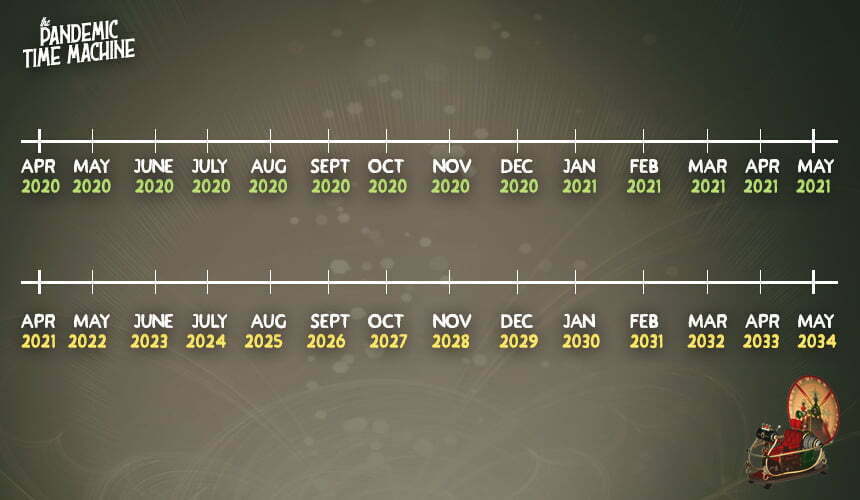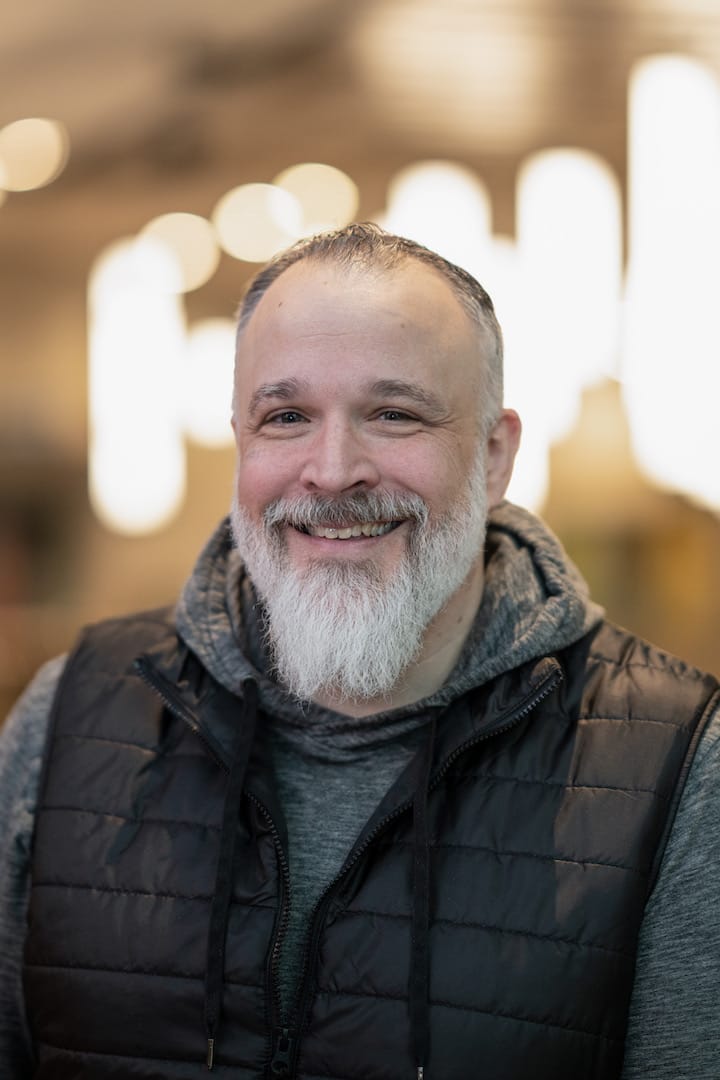

That statement is wrong.
The church has changed. The questions are:
Let me address the first question in a completely unscientific way. I say “unscientific” a bit tongue in cheek because it seems like the world of science, has been completely hijacked by political agendas.
What is science?
By definition, science is a department of systematized knowledge as an object of study. Science is a matter of proving a theory right or wrong based upon research, study, trial, and error.
What I am about to present is more from the gut. I believe it is Spirit-driven and will be proven true over time. I want to give you a formula for how much the church has changed. I am using church with the little “c”, not the big “C” Church. We recognize that the big “C” Church is the living organism that is made up universally of all believers. The little “c” church more of a concept of what we believe or think when we conceptual the local gathering of believers.
The formula is called “The Pandemic Time Machine”. Here is how the formula works.
For example, you put a pinpoint on a calendar for April of 2020 marking the beginning of COVID19 isolation and count the months until the official declaration that we are safely past the global pandemic. Let’s just say that we reach that point in May of 2021 after a vaccine is found and made readily available. Count the months between. There would have been 14 total months. That would mean you would take the year 2020 (start date) and add 14 years to that. That would mean in May of 2021 we would emerge from “The Pandemic Time Machine” to a new accelerated church reality that would not have experienced otherwise until the year 2034.

I initially struggled for the wording of the formula. I ended up with:
When I was first conceptualizing this I didn’t use the word “evolution.” I used words like devolved, deconstructed, and dismantled. Then I was convicted by the thought that all these words have negative connotations to them. Who am I to say that the future reality of the church is not a better reality than the concept we were living with at the end of the 2019 calendar year?
Is it possible that God could use “The Pandemic Time Machine” to move forward to a better reality? A reality that we would never electively chosen because were comfortable with the concept of our little “c” church realities?
It may be frightening for some to think about how much the church would change over fourteen years. Others may be invigorated by the chance for a new reality.
The Barna Research Group announced that one month into the COVID19 lockdown that one in three practicing Christians had stopped attending church. That study was done in May 2020. If you don’t think the number of people who have given up on attending church has widened you would be fooling yourself.
As churches all across the country begin re-opening they will be doing so in a new reality, a reality that has been accelerated by “The Pandemic Time Machine.” The churches that they are re-opening have changed. The old is gone. The new has been ushered in. The new reality did not ask permission from the old. The world changed and is continuing to evolve even as you read this.
Let me now attempt to give some clarity to the second question.
First, we must define what is that change? What does the accelerated future look like?
Without a flux capacitor retrofitted Delorean or a hot tub time machine we can not know for certain. That does not mean we can forecast some things.
The future church will be slow to recover past attendance norms.
We already know that many people that were labeled “practicing Christians” have already stopped attending church. We can say with some level of confidence that a good portion will not return whenever the church fully returns. Is that percentage one third as mentioned in the Barna research? My best guess would be that is the floor and not the ceiling.
Many small to midsized churches will close or be absorbed by larger churches.
Believe it or not, many churches shut their doors at the beginning of the global pandemic and have done nothing since. The extent of their activity has been posting a sign on their door stating, “Closed until further notice.” A good portion of these churches will never re-open.
Many small churches are run by a very part-time Pastor or a bi-vocational Pastor that essentially works a full-time job during the week and preaches on the weekends. These smaller churches are typically made up of aging congregations and are not equipped with any online presence. Congregants have been forced to take their faith home with them or go online church shopping if they are tech-savvy enough.
While churches are dealing with a loss of a third or more of their past congregants, not all are suffering.
The churches that have found success have done so because they have adapted to the realities of online worship gatherings, meetings, support groups, etc. Their continued and evolved activity has allowed them to gain church shoppers from other churches that have closed their doors. Their newly imagined online ministry has also allowed them to have genuine new growth and not just recycled growth from church hoppers.
The future church will be made up of multiple realities.
Online church and live streaming services are not going away. Churches that cancel their online efforts and live streaming when they officially re-open may see a drop in engagement. Online gatherings have opened doors to people that could not previously engage with churches because of obstacles that existed pre-pandemic and that will exist post-pandemic. Churches that will see future success will operate in both realities, online and in-person.
For churches to work efficiently in multiple realities they will need to staff appropriately and reallocate funding to do so.
The future church will be less program-driven and more people-driven.

The truth that people are more important than programs is one that no one would openly argue. Just because churches would not openly argue that doesn’t mean that they didn’t function as if programs were more important than people. The larger the church the more churches become dependant upon their programming. Programming becomes the engine that drives the machine of the church. When this happens people tend to become replaceable cogs in the machine. This is never the desire of church leadership but often the necessary evil in the demands of progress, growth.
If “The Pandemic Time Machine” was successful in anything it was the dismantling of church programs.
For churches who were already good at connecting people (volunteers) to other people and not to programs, they did not miss a beat. A pandemic shutdown should never cause a shortage of things for volunteers to do. That is if people are connected to people and not programs. For churches who relied on people (volunteers) to run their programs, they likely have lost all a vast majority of their volunteers and will struggle to get them to return. They lost their volunteers because the programs went away and they were merely a cog.
The future church will get more excited about its role in real local and social change than it will in the next big sermon series.
The Pastors that spend the majority of their time in their offices coming up with the next witty sermon series to promote will be viewed as irrelevant. The Pastors that are on the front lines creating real change in their communities will be viewed as champions of the faith.
In the future church will focus on people’s personal development and not solely on brand development.
The church of the future will be a bit of a throwback to the past. It will be less flash and big brand development and resemble more of what I believe the church was intended to be. It will be a one on one relationship-driven, world-changing organism.
Ability Ministry is driven by equipping and empowering churches to reach their disability communities for Christ. That will not change. How we go about doing that will be ever-changing.
We have already shifted from traditional curriculum development to video-driven content that can be used in both online and in-person gatherings.
We are currently working on a video-driven volunteer training series that can be used in either an online format or in-person training.
We are continually creating pandemic specific resources to help churches reach their people who are currently isolated.
We are working hard to remind churches that even when this pandemic passes there is a people group, people affected by disability, that will remain in isolation. Churches can not afford to leave this people group behind just because doors are beginning to re-open.
We are beginning to create future church resources that will help churches focus on personal development. We are already working on what we are calling a “Pandemic Proof Personal Growth Plan”. We can’t wait to share more on this in days to come.
These are just a few of the many things we are diligently working on to help equip and empower churches for the future reality that has been accelerated by “The Pandemic Time Machine.”


